Health and Wellbeing: Impacts of Colonization on Tangata Whenua
VerifiedAdded on 2022/08/13
|8
|1664
|11
Essay
AI Summary
This essay examines the profound and lasting impacts of colonization on the health and wellbeing of Tangata Whenua, the indigenous Māori people of New Zealand. It explores how colonization, beginning in the 1860s, undermined their aspirations and vitality, leading to significant health disparities. The essay focuses on the introduction and effects of alcohol and tobacco, highlighting their role in exacerbating health issues and social problems within Māori communities. It discusses historical context, including the introduction of these substances, and their impact on physical and mental health, life expectancy, and social wellbeing. The essay also considers implications for social work practice, emphasizing the need for educational interventions and culturally sensitive approaches to address the disparities. It underscores the importance of creating awareness and promoting holistic pedagogy to support the Tangata Whenua community, drawing on the author's experience as a support worker to illustrate practical strategies. Finally, the essay references relevant statistics and research to support its analysis and advocates for future support to address healthcare and social needs.
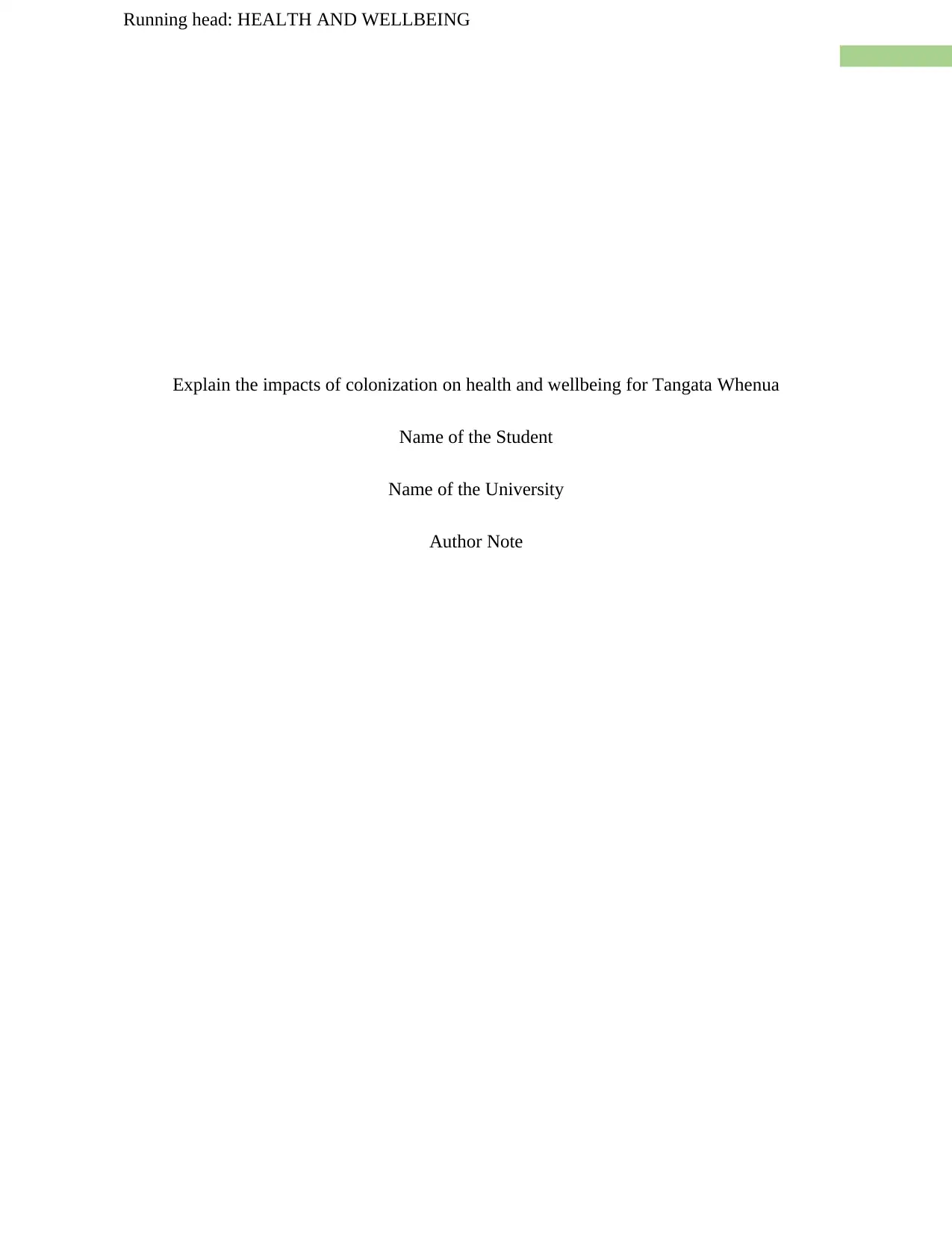
Running head: HEALTH AND WELLBEING
Explain the impacts of colonization on health and wellbeing for Tangata Whenua
Name of the Student
Name of the University
Author Note
Explain the impacts of colonization on health and wellbeing for Tangata Whenua
Name of the Student
Name of the University
Author Note
Paraphrase This Document
Need a fresh take? Get an instant paraphrase of this document with our AI Paraphraser
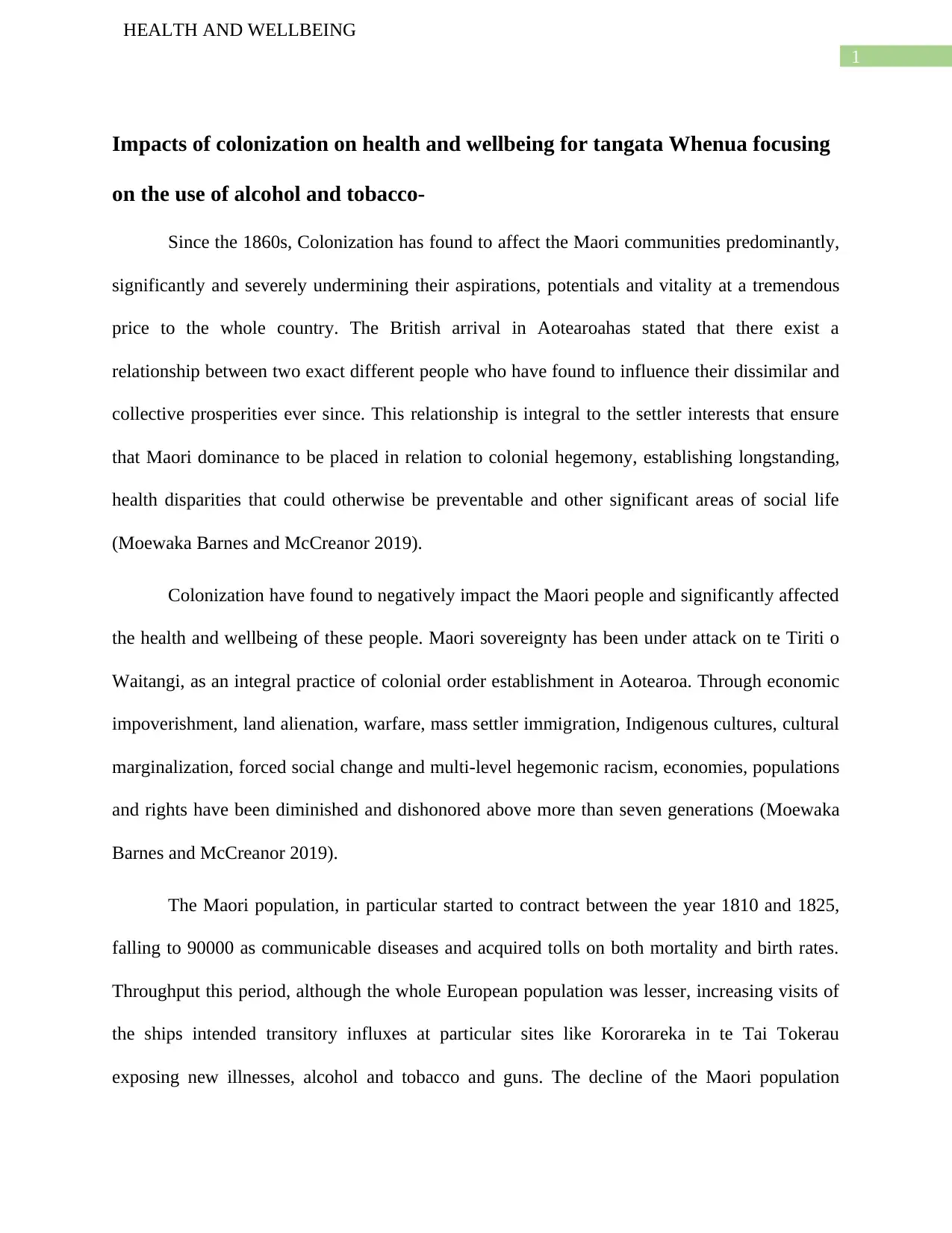
1
HEALTH AND WELLBEING
Impacts of colonization on health and wellbeing for tangata Whenua focusing
on the use of alcohol and tobacco-
Since the 1860s, Colonization has found to affect the Maori communities predominantly,
significantly and severely undermining their aspirations, potentials and vitality at a tremendous
price to the whole country. The British arrival in Aotearoahas stated that there exist a
relationship between two exact different people who have found to influence their dissimilar and
collective prosperities ever since. This relationship is integral to the settler interests that ensure
that Maori dominance to be placed in relation to colonial hegemony, establishing longstanding,
health disparities that could otherwise be preventable and other significant areas of social life
(Moewaka Barnes and McCreanor 2019).
Colonization have found to negatively impact the Maori people and significantly affected
the health and wellbeing of these people. Maori sovereignty has been under attack on te Tiriti o
Waitangi, as an integral practice of colonial order establishment in Aotearoa. Through economic
impoverishment, land alienation, warfare, mass settler immigration, Indigenous cultures, cultural
marginalization, forced social change and multi-level hegemonic racism, economies, populations
and rights have been diminished and dishonored above more than seven generations (Moewaka
Barnes and McCreanor 2019).
The Maori population, in particular started to contract between the year 1810 and 1825,
falling to 90000 as communicable diseases and acquired tolls on both mortality and birth rates.
Throughput this period, although the whole European population was lesser, increasing visits of
the ships intended transitory influxes at particular sites like Kororareka in te Tai Tokerau
exposing new illnesses, alcohol and tobacco and guns. The decline of the Maori population
HEALTH AND WELLBEING
Impacts of colonization on health and wellbeing for tangata Whenua focusing
on the use of alcohol and tobacco-
Since the 1860s, Colonization has found to affect the Maori communities predominantly,
significantly and severely undermining their aspirations, potentials and vitality at a tremendous
price to the whole country. The British arrival in Aotearoahas stated that there exist a
relationship between two exact different people who have found to influence their dissimilar and
collective prosperities ever since. This relationship is integral to the settler interests that ensure
that Maori dominance to be placed in relation to colonial hegemony, establishing longstanding,
health disparities that could otherwise be preventable and other significant areas of social life
(Moewaka Barnes and McCreanor 2019).
Colonization have found to negatively impact the Maori people and significantly affected
the health and wellbeing of these people. Maori sovereignty has been under attack on te Tiriti o
Waitangi, as an integral practice of colonial order establishment in Aotearoa. Through economic
impoverishment, land alienation, warfare, mass settler immigration, Indigenous cultures, cultural
marginalization, forced social change and multi-level hegemonic racism, economies, populations
and rights have been diminished and dishonored above more than seven generations (Moewaka
Barnes and McCreanor 2019).
The Maori population, in particular started to contract between the year 1810 and 1825,
falling to 90000 as communicable diseases and acquired tolls on both mortality and birth rates.
Throughput this period, although the whole European population was lesser, increasing visits of
the ships intended transitory influxes at particular sites like Kororareka in te Tai Tokerau
exposing new illnesses, alcohol and tobacco and guns. The decline of the Maori population
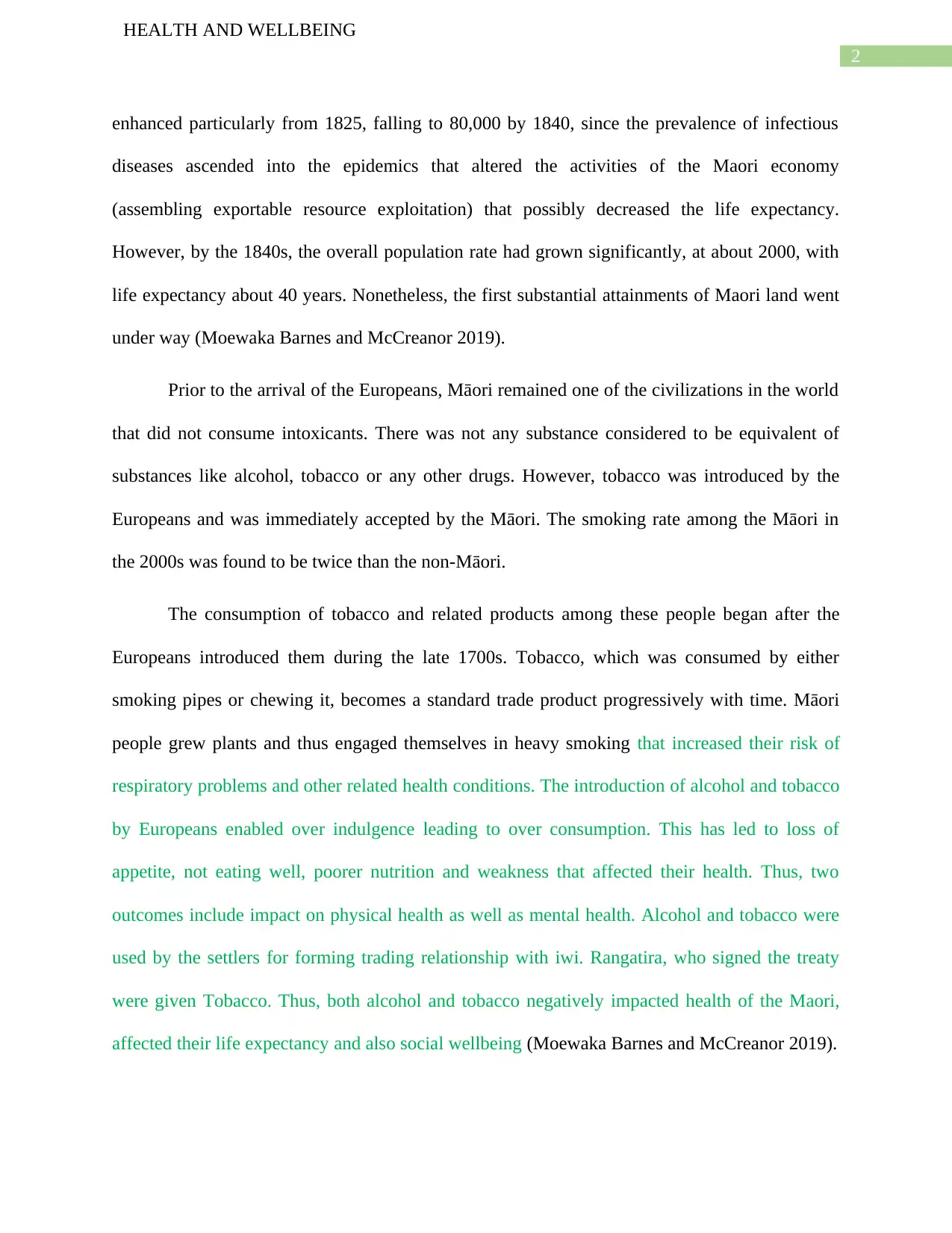
2
HEALTH AND WELLBEING
enhanced particularly from 1825, falling to 80,000 by 1840, since the prevalence of infectious
diseases ascended into the epidemics that altered the activities of the Maori economy
(assembling exportable resource exploitation) that possibly decreased the life expectancy.
However, by the 1840s, the overall population rate had grown significantly, at about 2000, with
life expectancy about 40 years. Nonetheless, the first substantial attainments of Maori land went
under way (Moewaka Barnes and McCreanor 2019).
Prior to the arrival of the Europeans, Māori remained one of the civilizations in the world
that did not consume intoxicants. There was not any substance considered to be equivalent of
substances like alcohol, tobacco or any other drugs. However, tobacco was introduced by the
Europeans and was immediately accepted by the Māori. The smoking rate among the Māori in
the 2000s was found to be twice than the non-Māori.
The consumption of tobacco and related products among these people began after the
Europeans introduced them during the late 1700s. Tobacco, which was consumed by either
smoking pipes or chewing it, becomes a standard trade product progressively with time. Māori
people grew plants and thus engaged themselves in heavy smoking that increased their risk of
respiratory problems and other related health conditions. The introduction of alcohol and tobacco
by Europeans enabled over indulgence leading to over consumption. This has led to loss of
appetite, not eating well, poorer nutrition and weakness that affected their health. Thus, two
outcomes include impact on physical health as well as mental health. Alcohol and tobacco were
used by the settlers for forming trading relationship with iwi. Rangatira, who signed the treaty
were given Tobacco. Thus, both alcohol and tobacco negatively impacted health of the Maori,
affected their life expectancy and also social wellbeing (Moewaka Barnes and McCreanor 2019).
HEALTH AND WELLBEING
enhanced particularly from 1825, falling to 80,000 by 1840, since the prevalence of infectious
diseases ascended into the epidemics that altered the activities of the Maori economy
(assembling exportable resource exploitation) that possibly decreased the life expectancy.
However, by the 1840s, the overall population rate had grown significantly, at about 2000, with
life expectancy about 40 years. Nonetheless, the first substantial attainments of Maori land went
under way (Moewaka Barnes and McCreanor 2019).
Prior to the arrival of the Europeans, Māori remained one of the civilizations in the world
that did not consume intoxicants. There was not any substance considered to be equivalent of
substances like alcohol, tobacco or any other drugs. However, tobacco was introduced by the
Europeans and was immediately accepted by the Māori. The smoking rate among the Māori in
the 2000s was found to be twice than the non-Māori.
The consumption of tobacco and related products among these people began after the
Europeans introduced them during the late 1700s. Tobacco, which was consumed by either
smoking pipes or chewing it, becomes a standard trade product progressively with time. Māori
people grew plants and thus engaged themselves in heavy smoking that increased their risk of
respiratory problems and other related health conditions. The introduction of alcohol and tobacco
by Europeans enabled over indulgence leading to over consumption. This has led to loss of
appetite, not eating well, poorer nutrition and weakness that affected their health. Thus, two
outcomes include impact on physical health as well as mental health. Alcohol and tobacco were
used by the settlers for forming trading relationship with iwi. Rangatira, who signed the treaty
were given Tobacco. Thus, both alcohol and tobacco negatively impacted health of the Maori,
affected their life expectancy and also social wellbeing (Moewaka Barnes and McCreanor 2019).
⊘ This is a preview!⊘
Do you want full access?
Subscribe today to unlock all pages.

Trusted by 1+ million students worldwide
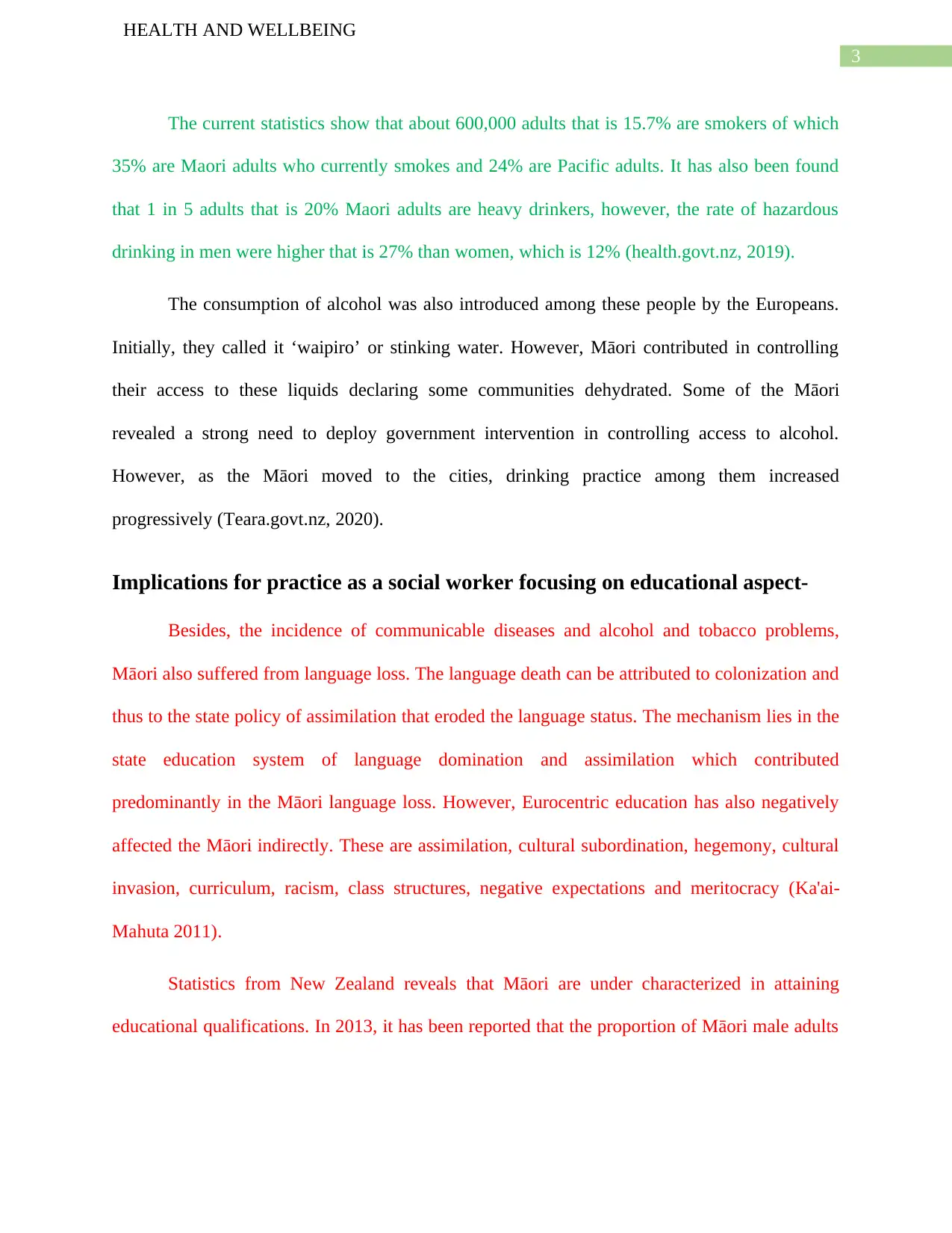
3
HEALTH AND WELLBEING
The current statistics show that about 600,000 adults that is 15.7% are smokers of which
35% are Maori adults who currently smokes and 24% are Pacific adults. It has also been found
that 1 in 5 adults that is 20% Maori adults are heavy drinkers, however, the rate of hazardous
drinking in men were higher that is 27% than women, which is 12% (health.govt.nz, 2019).
The consumption of alcohol was also introduced among these people by the Europeans.
Initially, they called it ‘waipiro’ or stinking water. However, Māori contributed in controlling
their access to these liquids declaring some communities dehydrated. Some of the Māori
revealed a strong need to deploy government intervention in controlling access to alcohol.
However, as the Māori moved to the cities, drinking practice among them increased
progressively (Teara.govt.nz, 2020).
Implications for practice as a social worker focusing on educational aspect-
Besides, the incidence of communicable diseases and alcohol and tobacco problems,
Māori also suffered from language loss. The language death can be attributed to colonization and
thus to the state policy of assimilation that eroded the language status. The mechanism lies in the
state education system of language domination and assimilation which contributed
predominantly in the Māori language loss. However, Eurocentric education has also negatively
affected the Māori indirectly. These are assimilation, cultural subordination, hegemony, cultural
invasion, curriculum, racism, class structures, negative expectations and meritocracy (Ka'ai-
Mahuta 2011).
Statistics from New Zealand reveals that Māori are under characterized in attaining
educational qualifications. In 2013, it has been reported that the proportion of Māori male adults
HEALTH AND WELLBEING
The current statistics show that about 600,000 adults that is 15.7% are smokers of which
35% are Maori adults who currently smokes and 24% are Pacific adults. It has also been found
that 1 in 5 adults that is 20% Maori adults are heavy drinkers, however, the rate of hazardous
drinking in men were higher that is 27% than women, which is 12% (health.govt.nz, 2019).
The consumption of alcohol was also introduced among these people by the Europeans.
Initially, they called it ‘waipiro’ or stinking water. However, Māori contributed in controlling
their access to these liquids declaring some communities dehydrated. Some of the Māori
revealed a strong need to deploy government intervention in controlling access to alcohol.
However, as the Māori moved to the cities, drinking practice among them increased
progressively (Teara.govt.nz, 2020).
Implications for practice as a social worker focusing on educational aspect-
Besides, the incidence of communicable diseases and alcohol and tobacco problems,
Māori also suffered from language loss. The language death can be attributed to colonization and
thus to the state policy of assimilation that eroded the language status. The mechanism lies in the
state education system of language domination and assimilation which contributed
predominantly in the Māori language loss. However, Eurocentric education has also negatively
affected the Māori indirectly. These are assimilation, cultural subordination, hegemony, cultural
invasion, curriculum, racism, class structures, negative expectations and meritocracy (Ka'ai-
Mahuta 2011).
Statistics from New Zealand reveals that Māori are under characterized in attaining
educational qualifications. In 2013, it has been reported that the proportion of Māori male adults
Paraphrase This Document
Need a fresh take? Get an instant paraphrase of this document with our AI Paraphraser
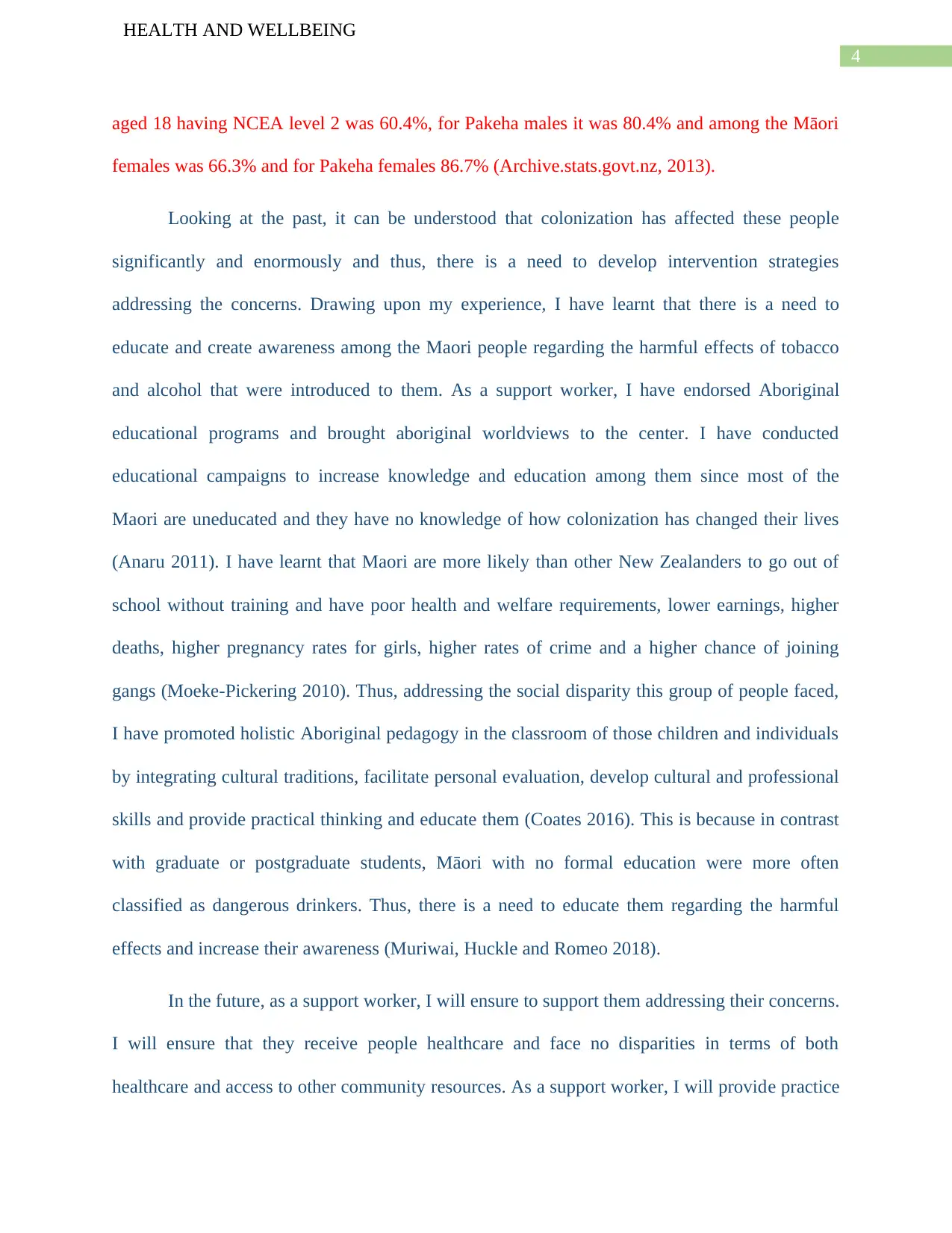
4
HEALTH AND WELLBEING
aged 18 having NCEA level 2 was 60.4%, for Pakeha males it was 80.4% and among the Māori
females was 66.3% and for Pakeha females 86.7% (Archive.stats.govt.nz, 2013).
Looking at the past, it can be understood that colonization has affected these people
significantly and enormously and thus, there is a need to develop intervention strategies
addressing the concerns. Drawing upon my experience, I have learnt that there is a need to
educate and create awareness among the Maori people regarding the harmful effects of tobacco
and alcohol that were introduced to them. As a support worker, I have endorsed Aboriginal
educational programs and brought aboriginal worldviews to the center. I have conducted
educational campaigns to increase knowledge and education among them since most of the
Maori are uneducated and they have no knowledge of how colonization has changed their lives
(Anaru 2011). I have learnt that Maori are more likely than other New Zealanders to go out of
school without training and have poor health and welfare requirements, lower earnings, higher
deaths, higher pregnancy rates for girls, higher rates of crime and a higher chance of joining
gangs (Moeke-Pickering 2010). Thus, addressing the social disparity this group of people faced,
I have promoted holistic Aboriginal pedagogy in the classroom of those children and individuals
by integrating cultural traditions, facilitate personal evaluation, develop cultural and professional
skills and provide practical thinking and educate them (Coates 2016). This is because in contrast
with graduate or postgraduate students, Māori with no formal education were more often
classified as dangerous drinkers. Thus, there is a need to educate them regarding the harmful
effects and increase their awareness (Muriwai, Huckle and Romeo 2018).
In the future, as a support worker, I will ensure to support them addressing their concerns.
I will ensure that they receive people healthcare and face no disparities in terms of both
healthcare and access to other community resources. As a support worker, I will provide practice
HEALTH AND WELLBEING
aged 18 having NCEA level 2 was 60.4%, for Pakeha males it was 80.4% and among the Māori
females was 66.3% and for Pakeha females 86.7% (Archive.stats.govt.nz, 2013).
Looking at the past, it can be understood that colonization has affected these people
significantly and enormously and thus, there is a need to develop intervention strategies
addressing the concerns. Drawing upon my experience, I have learnt that there is a need to
educate and create awareness among the Maori people regarding the harmful effects of tobacco
and alcohol that were introduced to them. As a support worker, I have endorsed Aboriginal
educational programs and brought aboriginal worldviews to the center. I have conducted
educational campaigns to increase knowledge and education among them since most of the
Maori are uneducated and they have no knowledge of how colonization has changed their lives
(Anaru 2011). I have learnt that Maori are more likely than other New Zealanders to go out of
school without training and have poor health and welfare requirements, lower earnings, higher
deaths, higher pregnancy rates for girls, higher rates of crime and a higher chance of joining
gangs (Moeke-Pickering 2010). Thus, addressing the social disparity this group of people faced,
I have promoted holistic Aboriginal pedagogy in the classroom of those children and individuals
by integrating cultural traditions, facilitate personal evaluation, develop cultural and professional
skills and provide practical thinking and educate them (Coates 2016). This is because in contrast
with graduate or postgraduate students, Māori with no formal education were more often
classified as dangerous drinkers. Thus, there is a need to educate them regarding the harmful
effects and increase their awareness (Muriwai, Huckle and Romeo 2018).
In the future, as a support worker, I will ensure to support them addressing their concerns.
I will ensure that they receive people healthcare and face no disparities in terms of both
healthcare and access to other community resources. As a support worker, I will provide practice

5
HEALTH AND WELLBEING
support to the people and their families in need with household tasks, paperwork as well as with
the personal care. In the future, I will monitor and assist with the heath care and societal needs of
this population.
HEALTH AND WELLBEING
support to the people and their families in need with household tasks, paperwork as well as with
the personal care. In the future, I will monitor and assist with the heath care and societal needs of
this population.
⊘ This is a preview!⊘
Do you want full access?
Subscribe today to unlock all pages.

Trusted by 1+ million students worldwide
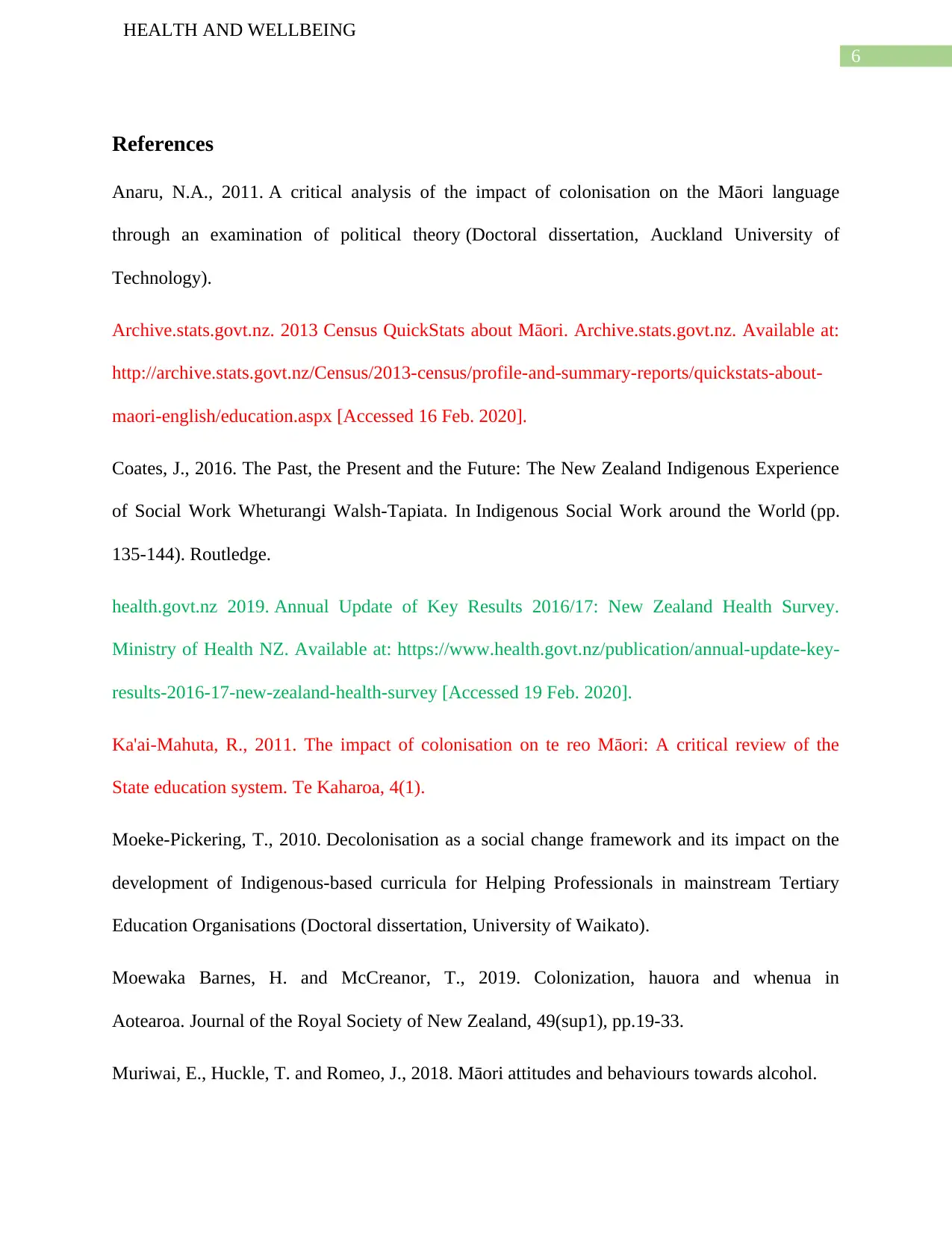
6
HEALTH AND WELLBEING
References
Anaru, N.A., 2011. A critical analysis of the impact of colonisation on the Māori language
through an examination of political theory (Doctoral dissertation, Auckland University of
Technology).
Archive.stats.govt.nz. 2013 Census QuickStats about Māori. Archive.stats.govt.nz. Available at:
http://archive.stats.govt.nz/Census/2013-census/profile-and-summary-reports/quickstats-about-
maori-english/education.aspx [Accessed 16 Feb. 2020].
Coates, J., 2016. The Past, the Present and the Future: The New Zealand Indigenous Experience
of Social Work Wheturangi Walsh-Tapiata. In Indigenous Social Work around the World (pp.
135-144). Routledge.
health.govt.nz 2019. Annual Update of Key Results 2016/17: New Zealand Health Survey.
Ministry of Health NZ. Available at: https://www.health.govt.nz/publication/annual-update-key-
results-2016-17-new-zealand-health-survey [Accessed 19 Feb. 2020].
Ka'ai-Mahuta, R., 2011. The impact of colonisation on te reo Māori: A critical review of the
State education system. Te Kaharoa, 4(1).
Moeke-Pickering, T., 2010. Decolonisation as a social change framework and its impact on the
development of Indigenous-based curricula for Helping Professionals in mainstream Tertiary
Education Organisations (Doctoral dissertation, University of Waikato).
Moewaka Barnes, H. and McCreanor, T., 2019. Colonization, hauora and whenua in
Aotearoa. Journal of the Royal Society of New Zealand, 49(sup1), pp.19-33.
Muriwai, E., Huckle, T. and Romeo, J., 2018. Māori attitudes and behaviours towards alcohol.
HEALTH AND WELLBEING
References
Anaru, N.A., 2011. A critical analysis of the impact of colonisation on the Māori language
through an examination of political theory (Doctoral dissertation, Auckland University of
Technology).
Archive.stats.govt.nz. 2013 Census QuickStats about Māori. Archive.stats.govt.nz. Available at:
http://archive.stats.govt.nz/Census/2013-census/profile-and-summary-reports/quickstats-about-
maori-english/education.aspx [Accessed 16 Feb. 2020].
Coates, J., 2016. The Past, the Present and the Future: The New Zealand Indigenous Experience
of Social Work Wheturangi Walsh-Tapiata. In Indigenous Social Work around the World (pp.
135-144). Routledge.
health.govt.nz 2019. Annual Update of Key Results 2016/17: New Zealand Health Survey.
Ministry of Health NZ. Available at: https://www.health.govt.nz/publication/annual-update-key-
results-2016-17-new-zealand-health-survey [Accessed 19 Feb. 2020].
Ka'ai-Mahuta, R., 2011. The impact of colonisation on te reo Māori: A critical review of the
State education system. Te Kaharoa, 4(1).
Moeke-Pickering, T., 2010. Decolonisation as a social change framework and its impact on the
development of Indigenous-based curricula for Helping Professionals in mainstream Tertiary
Education Organisations (Doctoral dissertation, University of Waikato).
Moewaka Barnes, H. and McCreanor, T., 2019. Colonization, hauora and whenua in
Aotearoa. Journal of the Royal Society of New Zealand, 49(sup1), pp.19-33.
Muriwai, E., Huckle, T. and Romeo, J., 2018. Māori attitudes and behaviours towards alcohol.
Paraphrase This Document
Need a fresh take? Get an instant paraphrase of this document with our AI Paraphraser
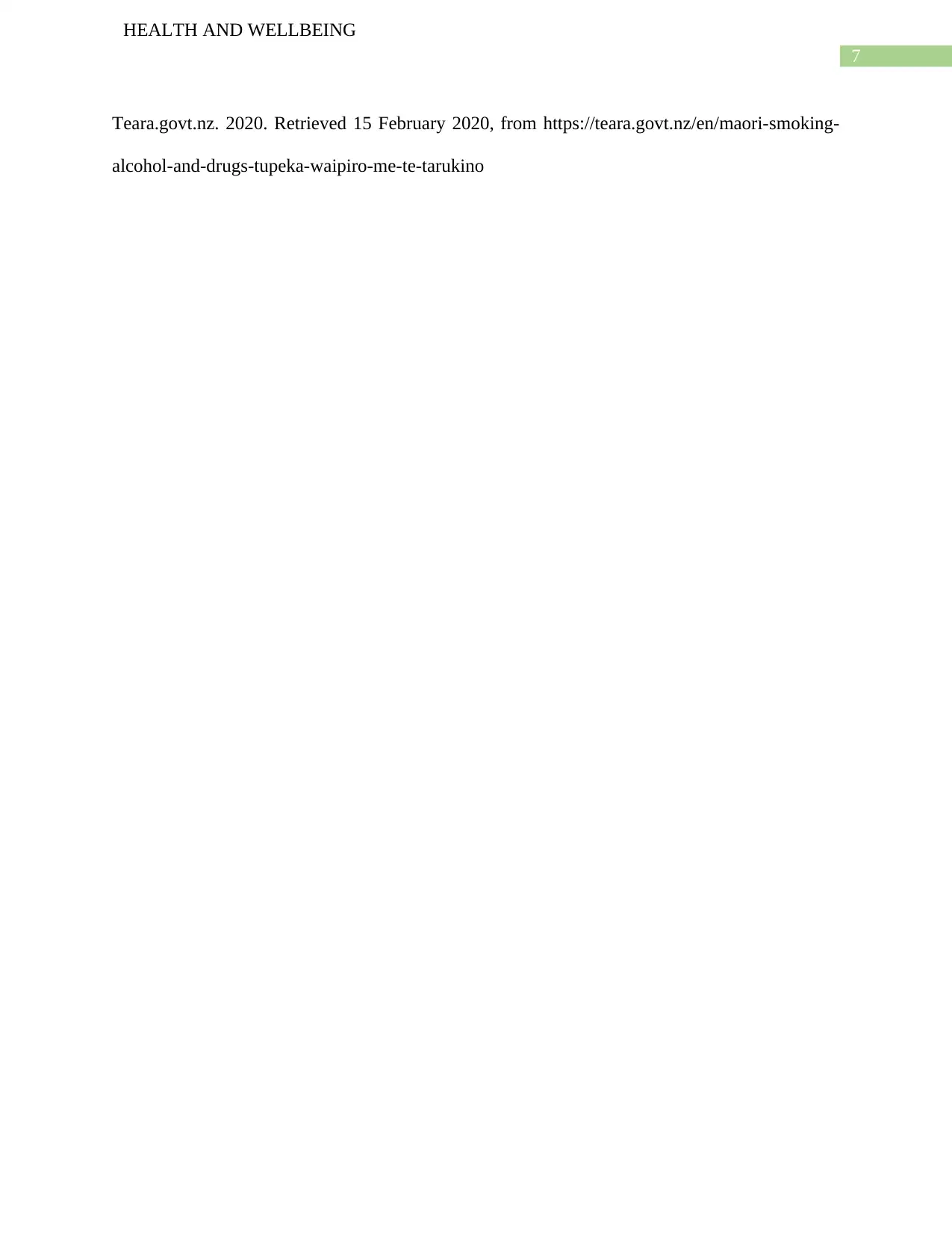
7
HEALTH AND WELLBEING
Teara.govt.nz. 2020. Retrieved 15 February 2020, from https://teara.govt.nz/en/maori-smoking-
alcohol-and-drugs-tupeka-waipiro-me-te-tarukino
HEALTH AND WELLBEING
Teara.govt.nz. 2020. Retrieved 15 February 2020, from https://teara.govt.nz/en/maori-smoking-
alcohol-and-drugs-tupeka-waipiro-me-te-tarukino
1 out of 8
Your All-in-One AI-Powered Toolkit for Academic Success.
+13062052269
info@desklib.com
Available 24*7 on WhatsApp / Email
![[object Object]](/_next/static/media/star-bottom.7253800d.svg)
Unlock your academic potential
Copyright © 2020–2026 A2Z Services. All Rights Reserved. Developed and managed by ZUCOL.